Key takeaways:
- Privacy advocacy emphasizes the individual’s right to control personal information and the implications of constant data monitoring.
- Apathy towards privacy can undermine collective action, making it essential to engage communities in discussions and raise awareness.
- Sharing personal experiences and fostering a supportive community can transform indifference into active participation in privacy advocacy.
- Effective communication techniques, such as clarity and relatable storytelling, enhance engagement and understanding of privacy issues.

Understanding privacy advocacy
Privacy advocacy is about more than just protecting data; it’s a movement rooted in the belief that individuals have a right to control their personal information. I remember a moment when I was sharing details on social media, only to realize later how much I had unwittingly exposed. It made me consider—how much do we truly understand about our digital footprints?
Many people think of privacy advocacy as simply a reaction to government policies or corporate practices, but it’s deeply personal. I’ve encountered friends who dismissed the importance of privacy, believing they had nothing to hide. Yet, this raises an essential question: if privacy is about more than secrecy, then what are the implications of living in a world where our data is constantly monitored and analyzed?
The emotional weight of privacy advocacy often hits home when we consider the consequences of data breaches or unauthorized surveillance. It’s frustrating to think about the vulnerability we face in an increasingly interconnected world. Each time I hear about a data leak, I wonder how many lives were disrupted, raising my awareness and igniting a passion for advocacy that I cannot ignore.
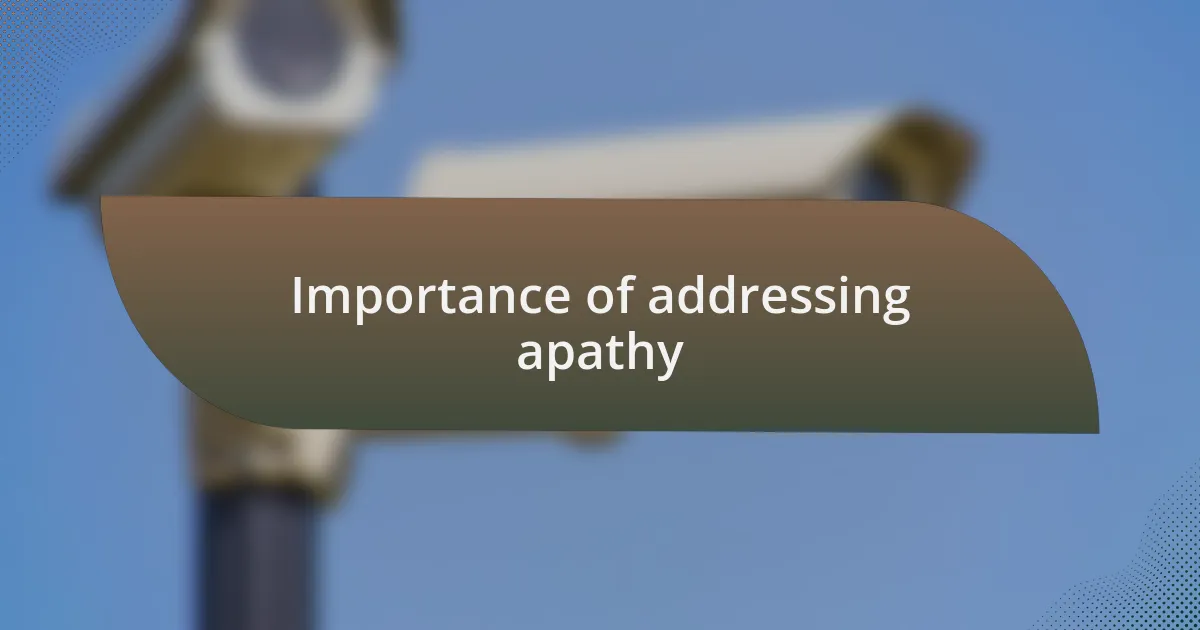
Importance of addressing apathy
Addressing apathy is crucial because it can lead to complacency in a world where privacy is constantly under threat. I once chatted with a colleague who shrugged off my concerns about his online habits, claiming that he was just “one small user.” This epitomizes a common mindset; the belief that individual actions don’t matter significantly undermines the collective effort needed to enact meaningful change.
When apathy prevails, it creates a culture of ignorance that can stifle progress. I recall attending a community meeting where only a handful of people showed up to discuss local privacy issues. It was disheartening to see so few voices willing to engage in critical conversations that affect us all. This lack of involvement fosters an environment where privacy violations continue unchallenged, making it imperative to combat apathy head-on.
Moreover, confronting apathy can empower individuals to reclaim their agency over personal information. I experienced this firsthand when I joined an online privacy advocacy group that inspired me to take simple but meaningful steps, like reviewing privacy settings on my devices. When people begin to understand their role in the broader advocacy movement, they transform from passive observers into active participants, igniting a ripple effect that can drive significant change.
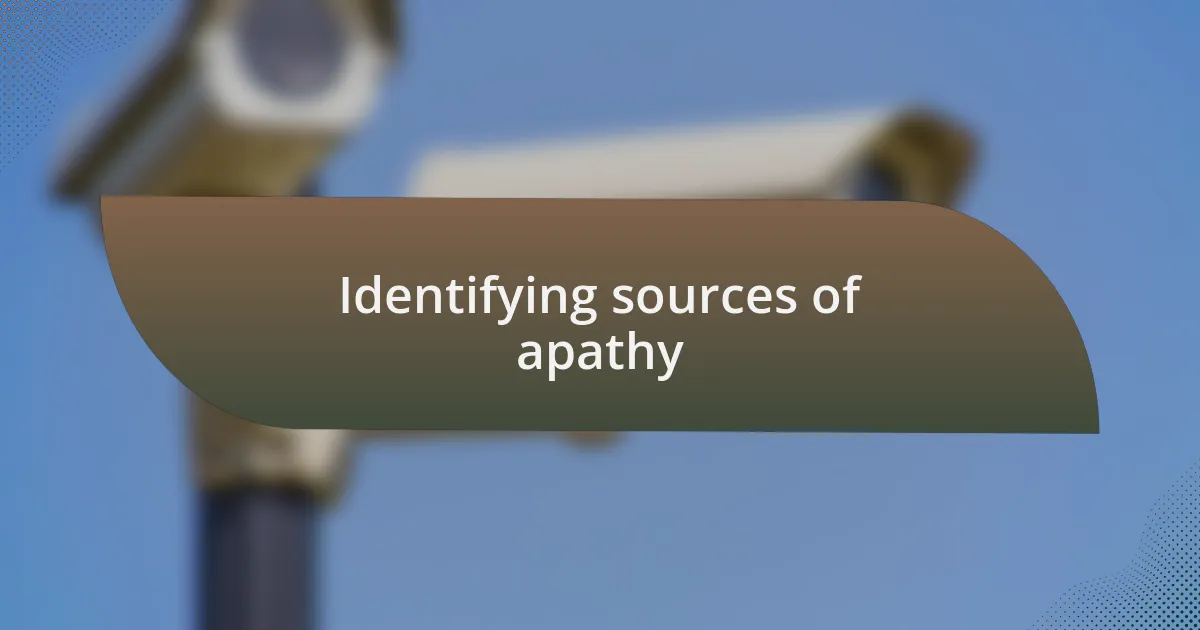
Identifying sources of apathy
Recognizing where apathy stems from can be quite revealing. In my journey, I’ve often noticed that a lack of education fuels this indifference. For instance, during a collaborative workshop on data privacy, many participants seemed disconnected, often asking, “Why does it even matter?” This question highlighted a broader issue — many individuals simply don’t grasp the repercussions of their online behaviors on their privacy and security.
Another source I’ve identified is the overwhelming nature of information. When I delve into articles about privacy violations, the sheer volume of data can be paralyzing. One day, I found myself scrolling past countless stories about breaches, feeling almost desensitized. It’s a common experience; when everything feels daunting, disengagement often feels like the simplest option. How many times have we all clicked away from an uncomfortable truth?
Lastly, I think social norms significantly shape apathy. When everyone around us dismisses the urgency of privacy, it’s easy to adopt the same nonchalant attitude. I remember sitting at a coffee shop, overhearing conversations trivializing their online privacy; it made me realize that shared beliefs can either inspire action or encourage complacency. By identifying these sources, we can develop strategies to foster awareness and motivate meaningful change in our communities.
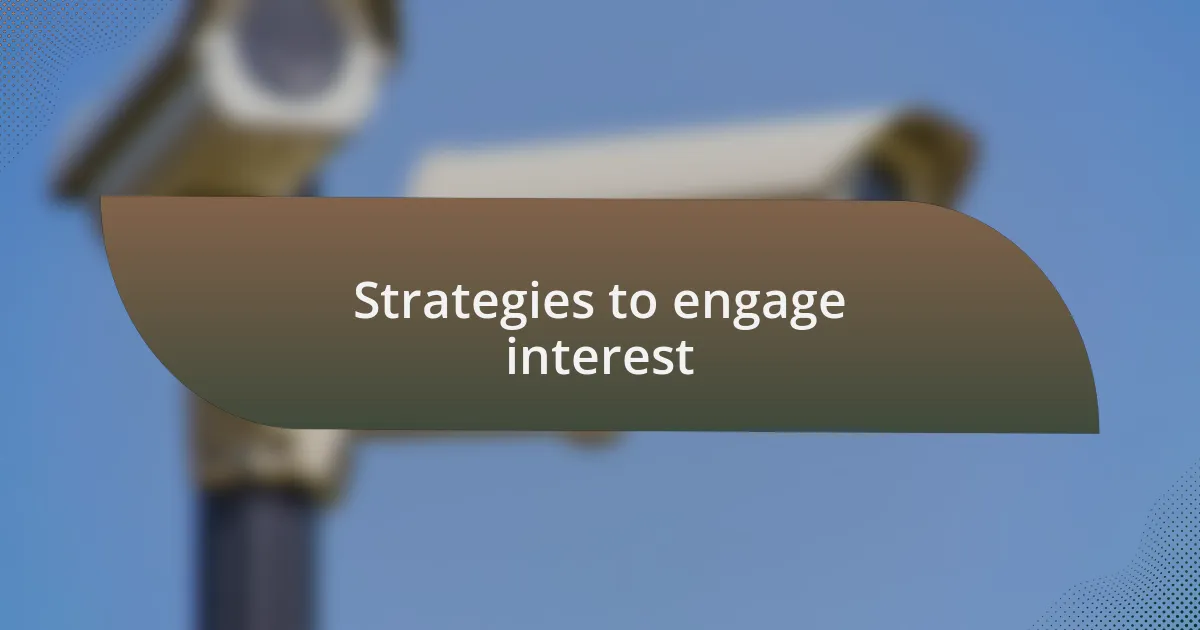
Strategies to engage interest
To engage interest effectively, I’ve found that creating relatable narratives is key. I once shared a story about a friend who inadvertently leaked personal information by clicking a seemingly harmless link. As I recounted the layers of consequences that unfolded, I could see the spark in people’s eyes. It’s amazing how a personal connection can transform indifference into curiosity. Have you ever witnessed someone suddenly realize the stakes after hearing a powerful story?
Another approach I’ve embraced is interactive learning. I remember hosting a workshop where participants embarked on a privacy audit of their own online habits. Watching them analyze their social media settings while gasping in disbelief was a turning point. Learning through hands-on experiences not only empowers individuals but also fosters a sense of ownership over their online privacy. Isn’t it fascinating how we often underestimate the power of direct engagement?
Lastly, incorporating humor can disarm apathy. During one session, I made a light-hearted comment about the absurdity of using “123456” as a password. The room burst into laughter; it relieved the tension and opened the door for deeper discussions about password security. Humor can create a bridge that allows people to explore uncomfortable realities without feeling overwhelmed. Don’t you think a little laughter can make tough conversations easier?
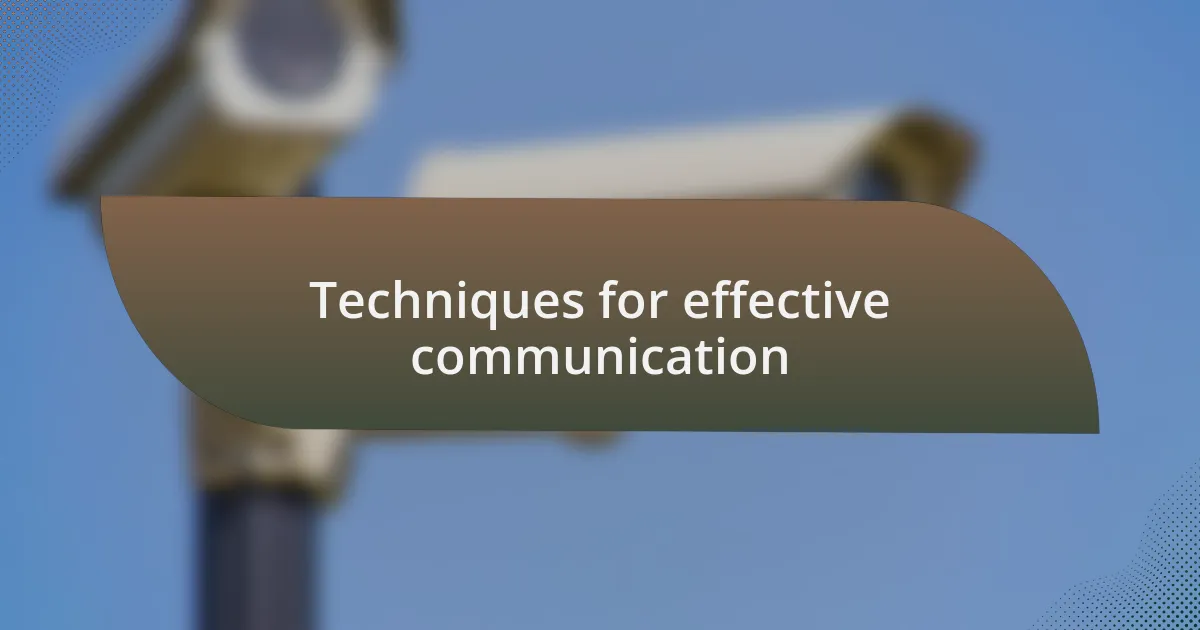
Techniques for effective communication
Effective communication often hinges on clarity. I’ve learned to avoid jargon and instead focus on straightforward language that everyone can grasp. During a recent talk, I simplified technical terms about data encryption into everyday analogies, like comparing it to sending a sealed letter instead of a postcard. This shift made the concept feel accessible, proving that when we make things clearer, we resonate deeper with our audience.
Body language and tone also play pivotal roles in conveying messages. I vividly recall a panel discussion where one speaker’s monotonous voice nearly lulled the audience to sleep, while others used inflection and gestures that sparked genuine engagement. I realized that our physical presence can amplify our words. Have you noticed how a simple change in posture or a sincere smile can elevate the impact of what we’re saying?
Lastly, feedback is a crucial tool for refining communication efforts. After a community event, I sought input on what resonated most with attendees. The insights were eye-opening, shedding light on both successes and areas for improvement. I firmly believe that inviting questions and reactions not only fosters a dialogue but also strengthens our connection with the audience. Isn’t it fascinating how a little curiosity can turn one-way communication into a rich conversation?
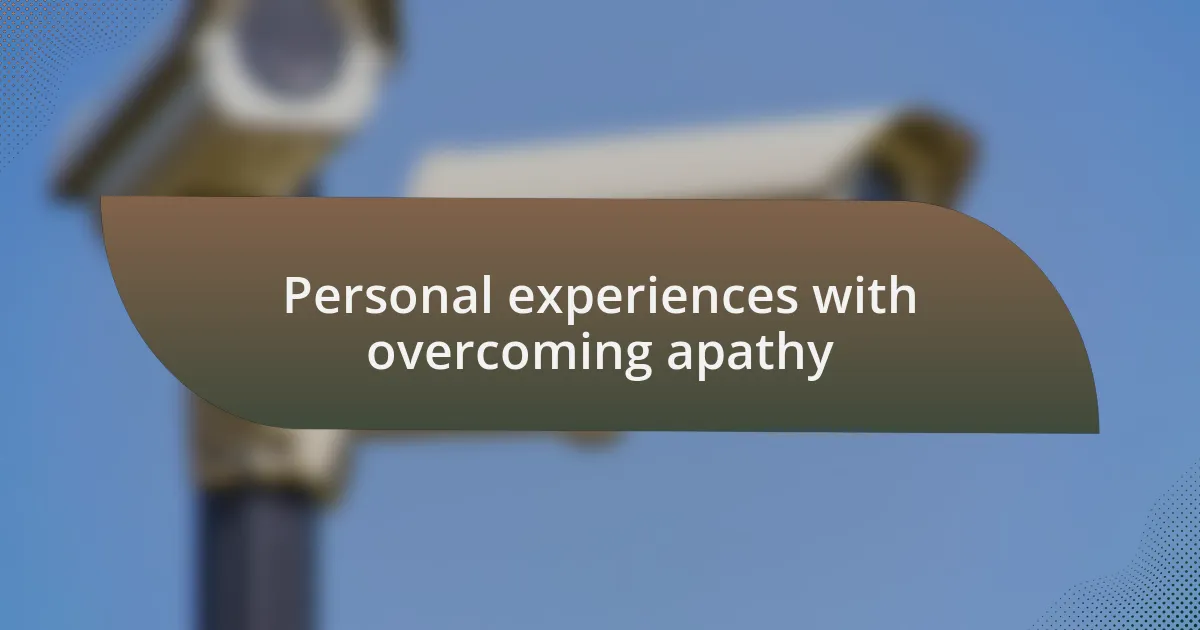
Personal experiences with overcoming apathy
It wasn’t until I stumbled upon a local workshop on data privacy that I realized I was letting apathy creep into my advocacy efforts. Initially, I was just going through the motions, attending events and reading reports, but that workshop reignited a passion within me. The energy in the room was infectious, and it made me question: When was the last time I truly engaged with my community about privacy issues?
Reflecting on this experience, I’ve found that sharing personal stories can be a powerful antidote to indifference. At a recent community meeting, I shared my own journey with online security—how one instance of a data breach had left me feeling vulnerable and scared. Seeing the audience’s reactions, I understood that my vulnerability made the topic real for them. It made me wonder: Could it be that authenticity is the key to awakening a collective sense of responsibility?
Over time, I’ve also discovered that surrounding myself with passionate advocates has been crucial in overcoming feelings of apathy. Regular conversations with fellow enthusiasts inspire me to stay informed and proactive. I’ve learned that it’s not just about individual efforts; it’s about fostering a community of like-minded individuals who challenge each other. When you engage with others who share your values, doesn’t it seem easier to rekindle that initial spark of enthusiasm?
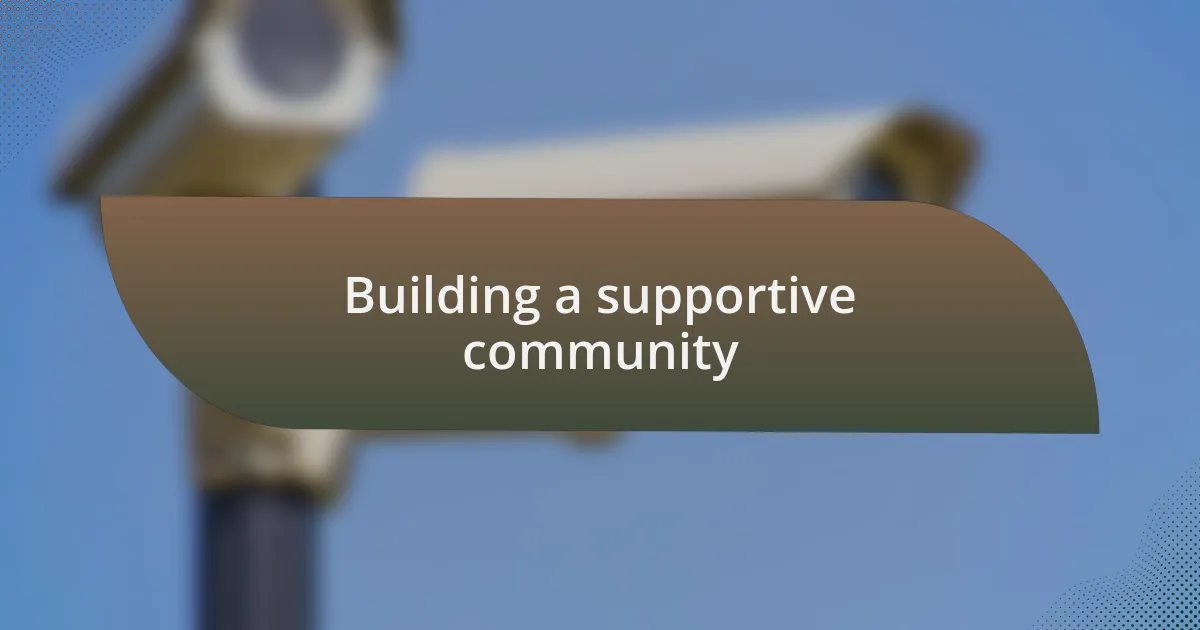
Building a supportive community
Building a supportive community involves setting the stage for open communication and shared experiences. I remember one evening when a friend hosted a “privacy potluck,” where everyone brought a dish and a story about their journey with digital security. This informal setup not only broke the ice but also allowed for genuine conversations about struggles and triumphs. People felt comfortable discussing their fears around cyber threats, which created a powerful bond that turned apathy into action.
In my experience, it’s vital to create safe spaces where individuals can express their concerns without judgment. I once attended a small gathering where members shared their “privacy failures.” One participant talked about falling victim to phishing, and suddenly, others started opening up about their similar experiences. These heartfelt exchanges nurtured empathy and understanding, prompting us all to take collective measures to enhance our digital safety. Isn’t it amazing how vulnerability can actually strengthen a community?
Moreover, I believe that celebrating small wins can significantly boost morale. After a neighborhood workshop, our group celebrated how many people signed up for privacy newsletters. The excitement was palpable. Recognizing these achievements, even the small ones, reminded us that each step forward counts, instilling a sense of hope and solidarity in our ongoing advocacy journey. How often do we stop to appreciate these moments of progress together?